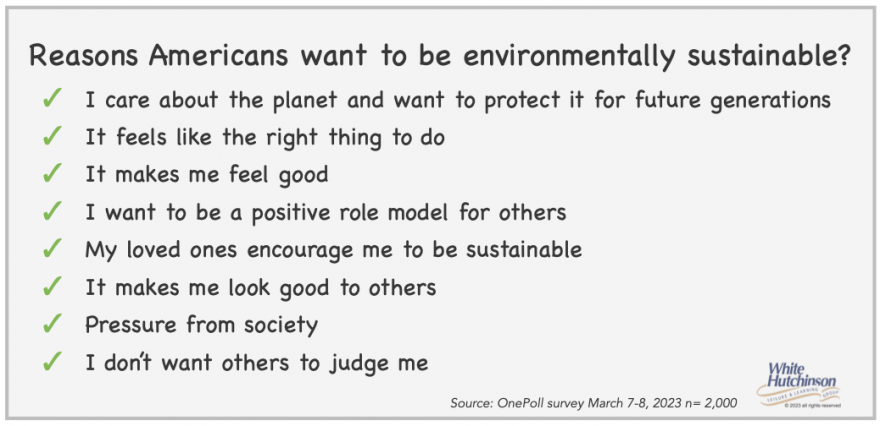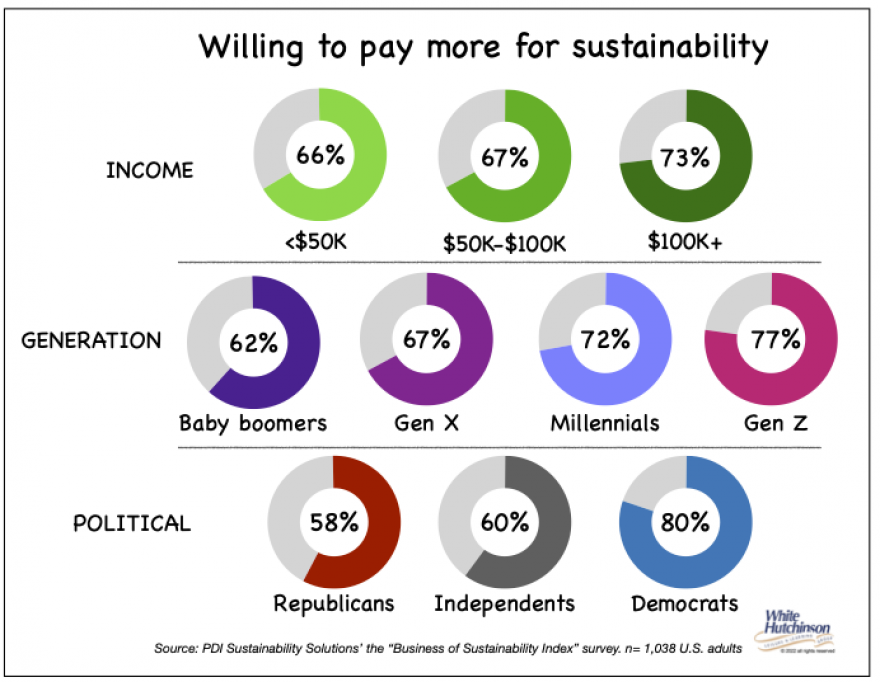
Vol. XXIII, No. 6, June 2023
The growing influence of sustainability on Americans' spending
The success of location-based entertainment venues (LBEs), including family entertainment centers (FECs), depends on various factors, such as attractions, food and beverage options, customer service, and the facility's aesthetics and design. Recently, another factor has been influencing the choices of companies Americans decide to do business with: whether the business aligns with their sustainable values.
According to a February OnePoll survey, a majority of Americans (73%) stated that it is important for them to support businesses and brands that share their same values. This sentiment was particularly strong among Gen Z (77%) and Millennials (82%).
Sustainability has become a paramount concern for people worldwide, and Americans, in particular, are increasingly mindful of the impact their purchasing decisions have on the environment and society. This shift in consumer behavior is driven by a combination of factors, including high-profile weather events, government regulations, and prominent climate change predictions in the news. It is no surprise that environmental impact is a top priority for many American consumers. As a result, sustainability has emerged as a significant influence on Americans' purchasing habits, forcing businesses to adapt and prioritize sustainable practices.

According to new research by OnePoll, nearly 7 in 10 Americans (68%) believe that climate change will have catastrophic effects within their lifetime. This sentiment is particularly strong among Gen Z (84%) and Millennials (75%), who feel that climate change will significantly impact their future.
Millennials and Gen Z, who together comprise a significant portion of the American population, have a profound influence on shaping sustainable purchasing trends. These generations prioritize sustainability as a fundamental aspect of their lifestyle. With their tech-savvy nature, they are more inclined to research and educate themselves about the environmental and social impact of their purchases. Their purchasing decisions reflect a desire to support brands that align with their values.
Another OnePoll survey in March found that 70% of respondents agreed that climate events from the past year (such as wildfires, floods, air-quality dangers, extreme heat, and droughts) have made them more likely to seek out sustainable products. Among this group, 38% had not been purchasing such products before, but recent climate events have motivated them to do so. The survey also found that caring for the planet and protecting it for future generations was the top reason for people to prioritize environmental sustainability. This was followed by a sense that it is "the right thing to do" and that environmentally sustainable actions make respondents feel good.

The pressing concerns surrounding climate change and environmental degradation have had a profound impact on American consumers' purchasing decisions. Individuals are opting for sustainable alternatives to reduce their carbon footprint.
In fact, Americans now rank sustainability and environmental issues as highly important as other top-of-mind concerns, such as inflation. Over three-quarters of Ipsos Online Community members (78%) currently consider sustainability an important factor when shopping for any product.
Research by the Shelton Group shows that two-thirds of the American population (66%) already hold companies strongly or very strongly responsible for changing their practices to positively impact the environment.
Additionally, a PDI Sustainable Solutions survey found that 68% of consumers are willing to pay more for sustainability.

The Business of Sustainable Index by GreenPrint revealed that two-thirds of US consumers (66%) and 80% of young US adults (ages 18-34) are willing to pay more for sustainable products compared to less sustainable competitors.
During a recent educational session at the National Restaurant Association convention in Chicago, Alex Nicolaou, senior manager for sustainability customer strategy at the Coca-Cola Company, stated that about 62% of US consumers surveyed in 2022 said they would reward restaurants that showed a commitment to sustainability. He also noted that restaurant operators' commitment to sustainability has grown over the years, with an increasing number stating that sustainability activities are necessary to remain competitive in the foodservice industry.
According to Kearney's Earth Day survey of 1,000 US consumers in March 2023, awareness of the environmental impacts of food choices has significantly increased. 42% of respondents reported always or nearly always considering environmental impacts when making purchasing decisions, representing an 18-percentage point increase compared to 2022. This indicates that the concept of "climavorism," actively making food choices based on climate impacts with the intent to benefit the planet, is transitioning from the consumer fringe to the heart of the mass market.
Major restaurant brands are already embracing sustainability. For example, Panera is promoting its climate-conscious Coolfood Meals, which result in 38% less carbon than an average meal. Noodles & Co. has introduced Impossible Panko Chicken, which uses 48% less land, 43% less water, and 36% less greenhouse gas emissions compared to chicken nuggets. Chipotle is opening all-electric, wind- and solar-powered restaurants that rely entirely on alternative energy sources. The company is also planning to offer more vegetarian and vegan menu items.
At the White Hutchinson Leisure & Learning Group, our company has been at the forefront of designing sustainable LBE projects. We designed the world's first eatertainment project to earn LEED certification, as well as the first center with bowling to receive a Silver or higher certification. We have worked on projects that utilize geothermal and solar energy for carbon-free energy production, as well as daylight harvesting to minimize the use of electric lighting. We have also been involved in the development of sea- and farm-to-table restaurants that focus on local, sustainable ingredients and reducing food waste. Currently, we are working on an agritourism project that incorporates regenerative farming practices to capture and store carbon in the soil.
Sustainability has emerged as a powerful force influencing Americans' purchasing decisions. Concerns about the environment have driven consumers to prioritize sustainable products and services. This includes the choices they make regarding location-based entertainment venues and food service businesses (as almost all LBEs include a foodservice component). As this trend continues to gain momentum, LBEs must adapt and integrate sustainable practices to remain competitive. By embracing sustainability, LBEs can meet consumer expectations, reduce their environmental impact, and lower operating costs. The influence of sustainability on Americans' purchases is a transformative shift that holds the potential to reshape the LBE industry, making venues that embrace sustainability more competitive.
Subscribe to monthly Leisure eNewsletter


